This article was co-authored by Roy Nattiv, MD. Dr. Roy Nattiv is a Board-Certified Pediatric Gastroenterologist in Los Angeles, California. With over 20 years of experience he specializes in a broad range of pediatric gastrointestinal and nutritional illnesses such as constipation, diarrhea, reflux, food allergies, poor weight gain, SIBO, IBD, and IBS. He completed his pediatric residency at the Children’s Hospital at Montefiore, Albert Einstein College of Medicine in New York, and his fellowship at the University of California, San Francisco (UCSF). While at UCSF, he was a California Institute of Regenerative Medicine (CIRM) fellowship trainee and was awarded the North American Society for Pediatric Gastroenterology, Hepatology, and Nutrition (NASPGHAN) Fellow to Faculty Award in Pediatric IBD Research. Dr. Nattiv received his undergrad degree from the University of California, Berkeley, and his medical degree (MD) from the Sackler School of Medicine in Tel Aviv, Israel.
There are 8 references cited in this article, which can be found at the bottom of the page.
wikiHow marks an article as reader-approved once it receives enough positive feedback. In this case, several readers have written to tell us that this article was helpful to them, earning it our reader-approved status.
This article has been viewed 55,768 times.
An endoscope is a tiny camera that is placed on the end of a long, thin, and flexible tube. A gastroenterologist, who is a physician who specializes in diseases regarding the digestive system, uses an endoscope to be able to see the structures within your digestive system. This procedure is called an endoscopy. If you have an appointment to get an endoscopy, it will be helpful for you to know how to prepare for the procedure. There are several steps you can take to ease your tension and feel more prepared.
Steps
Getting Your Body Ready
-
1Stop taking certain medications. There are several things you will need to do to physically prepare for your endoscopy. Some medications might interfere with the procedure or the results. Make sure your doctor is aware of all medications that you are taking.[1]
- If you are on blood thinners, you will need to stop taking them several days prior to the procedure. These medications could increase your risk of bleeding during the endoscopy.
- You may need to stop taking your blood pressure medication for a few days. Ask your doctor about the specific dosage you are taking.
- Discuss supplements with your doctor. If you take vitamins or natural medications, make sure that your doctor has that information.
- Always make sure that you get specific instructions from your doctor before you stop taking any medications that you are currently on.
-
2Fast for 10-12 hours before the procedure. The point of an upper endoscopy is to allow your doctor to examine your upper GI tract. To get a clear picture, your stomach needs to be empty, so don't eat or drink anything ahead of time.[2]
- Do not eat any solid food for 10-12 hours before your endoscopy. You should also avoid chewing gum during this period.
- Do not drink any liquids for 10-12 hours before the endoscopy. Ask your doctor if you may have a small amount of water.
- If you smoke, avoid doing so for at least 6 hours prior to the procedure. It can interfere with the results.
Advertisement -
3Be mindful of your needs. Take your medical history into consideration as you prepare for your endoscopy. For example, if you have asthma, take your inhaler with you. You won't be able to use it during the procedure, but you might want it before or after the endoscopy.[3]
- Make sure to empty your bladder. Going to the bathroom before the procedure will help you feel more comfortable.
- Know that the procedure will take about 30-45 minutes. If you wear corrective lenses, think about whether you would be more comfortable in your contacts or glasses.
- Remove any uncomfortable jewelry. You will wear a gown for the procedure, but bring comfortable clothes to wear home.
- Make sure that you arrange for someone to take you home after the procedure. You will have some lingering effects from the sedation and you may not feel well.
-
4Follow your doctor's orders. Make sure that you follow your doctor's instructions very carefully. It is important that you are mindful of the policies regarding fasting and stopping medications. Ask your doctor to write down all of the instructions so that you don't forget anything.[4]
- Take some time to go over your medical history with your doctor. Make sure that he is aware of any pre-existing conditions.
- For example, maybe you are diabetic or have heart disease. Make sure your doctor takes that into account when giving you instructions.
- Enlist a family member or friend. They can help make sure you obey the rules before your procedure.
Feeling Prepared for Your Procedure
-
1Plan your recovery. For most people, you will not feel any significant physical discomfort after your endoscopy. However, it is important to remember that you will be taking a sedative for the procedure. It might take a while for that medication to wear off.[5]
- You might feel perfectly fine after the procedure. But you might be less alert than you realize.
- For many people, a sedative can impair judgement and delay reaction time. Avoid making any major decisions for 24 hours after your procedure.
- Plan to take the day off work. You will likely be physically capable of working, but your mind not be working as fast as usual. Take a break.
-
2Find someone to help you. Because of the sedative, you should not drive after your endoscopy. Ask a friend or family member to drive you home. You can also ask them to be there for you during the procedure.[6]
- Be honest about your needs. Try saying, "I'm having a minor procedure, but I'm a bit nervous. Would you mind being on site for moral support?"
- Choose someone responsible. You want to know that the person you ask to give you a ride home will show up on time.
-
3Anticipate side effects. Most people do not suffer from any complications during or after an endoscopy. However, as with any procedure, there are risks.[7]
- Talk to your doctor about possible side effects. Ask him to tell you symptoms to look for.
- There are several indicators to look for. If you have a temperature or stomach ache in the 48 hours following your procedure, make sure to contact your doctor.
- Difficulty breathing and vomiting are also signs of distress. Call your doctor if you experience these symptoms.
-
4Be prepared to get your results. Your doctor may be able to give you some initial results immediately. For example, he can tell you if there are any obvious signs of damage. Your doctor might discuss these findings with you after the procedure.[8]
- Remember that the sedative might impair your concentration. Depending on how you feel, your doctor might wait to discuss his findings.
- Some tests will take longer to complete. If your doctor collected tissue, these samples will likely need to be sent to a lab.
- It may take several days to get some of your results. Ask your doctor for a clear timeline about when you can expect some answers.
Talking to Your Doctor
-
1Learn about the procedure. An endoscopy can serve several purposes. Your doctor might advise an endoscopy to investigate symptoms such as nausea or vomiting. If your doctor recommends an endoscopy, take time to learn why.[9]
- In addition to investigating digestive symptoms, your doctor might use the endoscopy to collect tissue samples. This is also known as a biopsy.
- Tissue samples can help your doctor to diagnose your condition. The tissue samples can be tested for diseases such as anemia and certain cancers.
- If your doctor suggests this procedure, you do not need to immediately be alarmed. It is a common procedure and used to diagnose many conditions.
-
2Know what to expect. Talk to your doctor about what the procedure entails. You can also ask him to provide additional resources, such as pamphlets or useful web sites. If you know what to expect, you will feel more comfortable about having the procedure.[10]
- You will be awake during an endoscopy, however you will also be slightly sedated with a rapid onset and short duration medication. It is a same day procedure that takes place in a doctor's office or exam room.
- During the procedure, you will lie down either on your back or side. Your doctor may give you a sedative to help you relax.
- The endoscope, which includes a small camera, will be inserted into your mouth. Your doctor will extend the scope down into your esophagus so that the camera can capture images.
- Your doctor might use other small tools to gather the tissue samples. You will not be able to talk during the procedure, but you will be able to breathe and make sounds.
- Talk to your doctor about what you can expect after the procedure, as well.[11]
-
3Understand different procedures. It is important to understand that there are actually two common types of endoscopy. One is the upper endoscopy and the other is a colonoscopy. Make sure to clarify with your doctor which type of procedure you need.[12]
- Your doctor will use an endoscopy to view the upper digestive tract, or a colonoscopy to view the lower digestive tract.
- The upper endoscopy is the procedure where the scope is inserted through the mouth. It will allow your doctor to look at the small intestines and stomach in addition to the esophagus.
- During a colonoscopy, the camera is attached to a flexible tube inserted through the rectum. This procedure allows your doctor to examine the large intestine, colon, and rectum.
- Both procedures are used to diagnose disease and investigate symptoms. Both are common, same day procedures.
-
4Ask questions. You may be disconcerted if your doctor recommends an endoscopy. It is normal to be nervous about undergoing a new procedure. Take time to ask your doctor several questions about his recommendation.[13]
- Gain an understanding of why you need the procedure. Try saying, "What, specifically, makes you think this procedure is necessary for me?"
- You can also ask about the procedure itself. You might say, "Can you tell me if it will hurt?"
- Ask your doctor about possible side effects. You can also ask how regularly he performs the procedure.
- Feel free to take notes. You might hear some unfamiliar medical terms and want to write down what they mean.
Expert Q&A
Did you know you can get expert answers for this article?
Unlock expert answers by supporting wikiHow
-
QuestionCan a cold affect endoscopy
 Marsha Durkin, RNMarsha Durkin is a Registered Nurse and Laboratory Information Specialist for Mercy Hospital and Medical Center in Illinois. She received her Associates Degree in Nursing from Olney Central College in 1987.
Marsha Durkin, RNMarsha Durkin is a Registered Nurse and Laboratory Information Specialist for Mercy Hospital and Medical Center in Illinois. She received her Associates Degree in Nursing from Olney Central College in 1987.
Registered Nurse
-
QuestionWhat should you not do before an endoscopy?
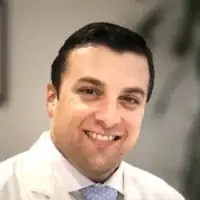 Roy Nattiv, MDDr. Roy Nattiv is a Board-Certified Pediatric Gastroenterologist in Los Angeles, California. With over 20 years of experience he specializes in a broad range of pediatric gastrointestinal and nutritional illnesses such as constipation, diarrhea, reflux, food allergies, poor weight gain, SIBO, IBD, and IBS. He completed his pediatric residency at the Children’s Hospital at Montefiore, Albert Einstein College of Medicine in New York, and his fellowship at the University of California, San Francisco (UCSF). While at UCSF, he was a California Institute of Regenerative Medicine (CIRM) fellowship trainee and was awarded the North American Society for Pediatric Gastroenterology, Hepatology, and Nutrition (NASPGHAN) Fellow to Faculty Award in Pediatric IBD Research. Dr. Nattiv received his undergrad degree from the University of California, Berkeley, and his medical degree (MD) from the Sackler School of Medicine in Tel Aviv, Israel.
Roy Nattiv, MDDr. Roy Nattiv is a Board-Certified Pediatric Gastroenterologist in Los Angeles, California. With over 20 years of experience he specializes in a broad range of pediatric gastrointestinal and nutritional illnesses such as constipation, diarrhea, reflux, food allergies, poor weight gain, SIBO, IBD, and IBS. He completed his pediatric residency at the Children’s Hospital at Montefiore, Albert Einstein College of Medicine in New York, and his fellowship at the University of California, San Francisco (UCSF). While at UCSF, he was a California Institute of Regenerative Medicine (CIRM) fellowship trainee and was awarded the North American Society for Pediatric Gastroenterology, Hepatology, and Nutrition (NASPGHAN) Fellow to Faculty Award in Pediatric IBD Research. Dr. Nattiv received his undergrad degree from the University of California, Berkeley, and his medical degree (MD) from the Sackler School of Medicine in Tel Aviv, Israel.
Board Certified Gastroenterologist
Warnings
- While endoscopy procedures are generally painless, there might be some minimal bleeding if the doctor takes some tissue for a biopsy.⧼thumbs_response⧽
- Seek medical attention after an endoscopy if you experience fever, chest pain, shortness of breath, bloody, black or very dark colored stools, difficulty swallowing, severe or persistent abdominal pain, or vomiting, especially if your vomit is bloody or looks like coffee grounds.⧼thumbs_response⧽
References
- ↑ http://www.mayoclinic.org/tests-procedures/endoscopy/basics/how-you-prepare/prc-20020363
- ↑ Roy Nattiv, MD. Board Certified Gastroenterologist. Expert Interview. 18 December 2020.
- ↑ https://www.dhccenter.com/procedure-prep/upper-endoscopy-egd-preparation/
- ↑ http://www.hopkinsmedicine.org/healthlibrary/test_procedures/gastroenterology/esophagogastroduodenoscopy_92,p07717/
- ↑ http://www.mayoclinic.org/tests-procedures/endoscopy/basics/how-you-prepare/prc-20020363
- ↑ http://www.mayoclinic.org/tests-procedures/endoscopy/basics/how-you-prepare/prc-20020363
- ↑ http://patient.info/health/gastroscopy-endoscopy
- ↑ http://www.niddk.nih.gov/health-information/health-topics/diagnostic-tests/upper-gi-endoscopy/Pages/diagnostic-test.aspx
- ↑ http://www.mayoclinic.org/tests-procedures/endoscopy/basics/what-you-can-expect/prc-20020363
- ↑ http://patient.info/health/gastroscopy-endoscopy
- ↑ Roy Nattiv, MD. Board Certified Gastroenterologist. Expert Interview. 18 December 2020.
- ↑ http://www.dana-farber.org/Health-Library/Understanding-upper-endoscopy-and-colonoscopy.aspx
- ↑ http://www.dana-farber.org/Health-Library/Understanding-upper-endoscopy-and-colonoscopy.aspx
About This Article
To prepare for an endoscopy, follow your doctor's advice, which may include stopping some medications, since they may interfere with the results. Don't eat solids or drink fluids during the 8 hours before your endoscopy to avoid blocking your digestive tract. Additionally, arrange for someone to help you afterwards, since your reaction times and judgement will be impaired by the sedative you need to take. Before you go to the procedure, go to the bathroom, since you'll feel more comfortable on an empty bladder. For tips from our Medical co-author on how to deal with possible side effects, read on!
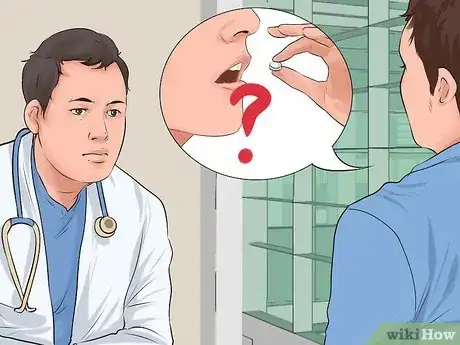

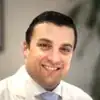
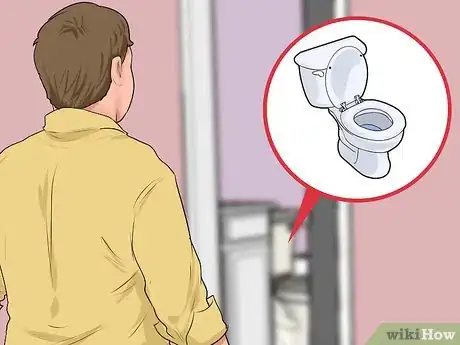
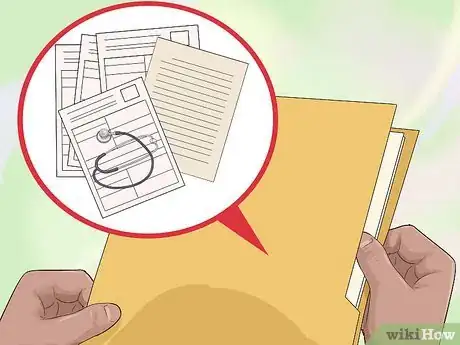



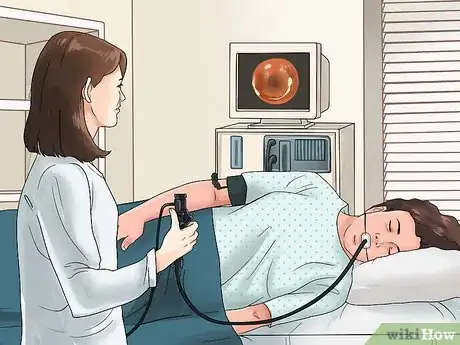
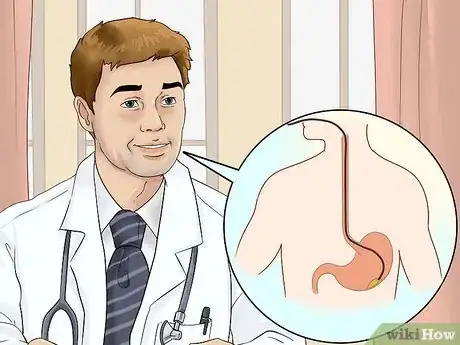
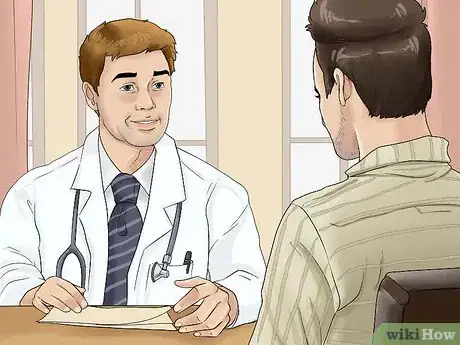

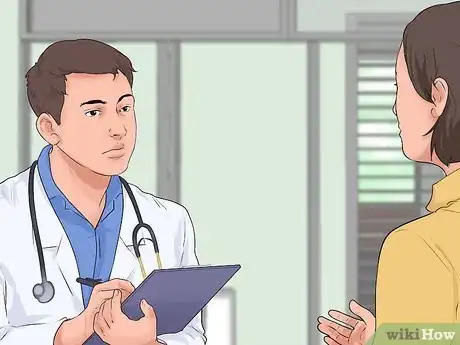
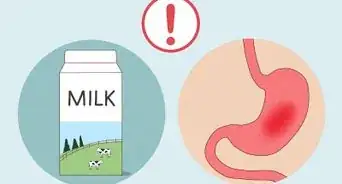
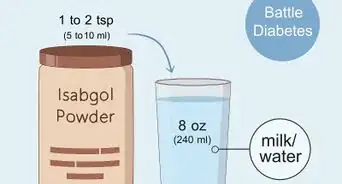







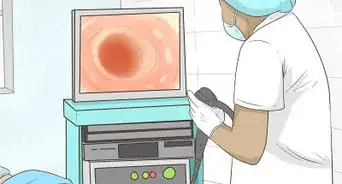



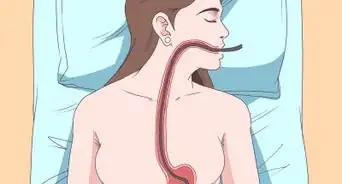








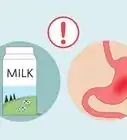
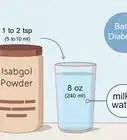
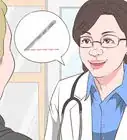




































Medical Disclaimer
The content of this article is not intended to be a substitute for professional medical advice, examination, diagnosis, or treatment. You should always contact your doctor or other qualified healthcare professional before starting, changing, or stopping any kind of health treatment.
Read More...